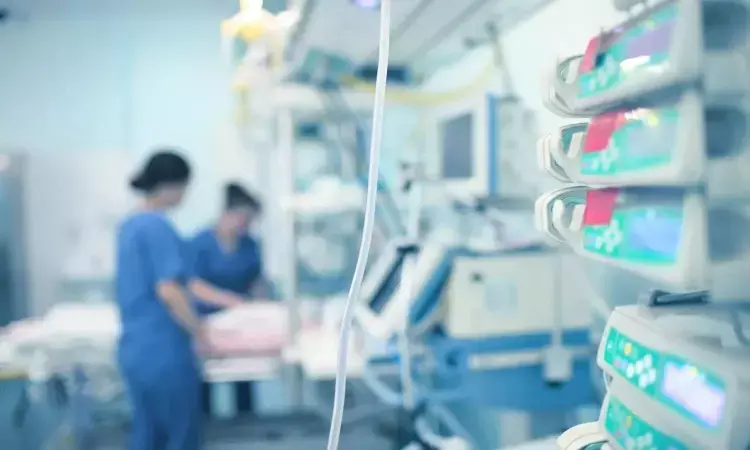- Home
- Medical news & Guidelines
- Anesthesiology
- Cardiology and CTVS
- Critical Care
- Dentistry
- Dermatology
- Diabetes and Endocrinology
- ENT
- Gastroenterology
- Medicine
- Nephrology
- Neurology
- Obstretics-Gynaecology
- Oncology
- Ophthalmology
- Orthopaedics
- Pediatrics-Neonatology
- Psychiatry
- Pulmonology
- Radiology
- Surgery
- Urology
- Laboratory Medicine
- Diet
- Nursing
- Paramedical
- Physiotherapy
- Health news
- Fact Check
- Bone Health Fact Check
- Brain Health Fact Check
- Cancer Related Fact Check
- Child Care Fact Check
- Dental and oral health fact check
- Diabetes and metabolic health fact check
- Diet and Nutrition Fact Check
- Eye and ENT Care Fact Check
- Fitness fact check
- Gut health fact check
- Heart health fact check
- Kidney health fact check
- Medical education fact check
- Men's health fact check
- Respiratory fact check
- Skin and hair care fact check
- Vaccine and Immunization fact check
- Women's health fact check
- AYUSH
- State News
- Andaman and Nicobar Islands
- Andhra Pradesh
- Arunachal Pradesh
- Assam
- Bihar
- Chandigarh
- Chattisgarh
- Dadra and Nagar Haveli
- Daman and Diu
- Delhi
- Goa
- Gujarat
- Haryana
- Himachal Pradesh
- Jammu & Kashmir
- Jharkhand
- Karnataka
- Kerala
- Ladakh
- Lakshadweep
- Madhya Pradesh
- Maharashtra
- Manipur
- Meghalaya
- Mizoram
- Nagaland
- Odisha
- Puducherry
- Punjab
- Rajasthan
- Sikkim
- Tamil Nadu
- Telangana
- Tripura
- Uttar Pradesh
- Uttrakhand
- West Bengal
- Medical Education
- Industry
Optimal Vasopressor Timing in Septic Shock: Study Reveals Early, Not Extremely Early, May Be Key

Taiwan: A recent systematic review and meta-analysis published in Annals of Intensive Care have raised important questions about the timing of vasopressor initiation in adults with septic shock. The researchers revealed that while initiating vasopressors within 1-3 hours of diagnosis was associated with reduced short-term mortality, administering them within the first hour showed no additional benefit.
Experts emphasize the need for further research to determine the optimal timing for vasopressor use to enhance survival outcomes in septic shock patients.
Septic shock is a severe and life-threatening condition characterized by a drop in blood pressure that doesn't respond to fluid replacement, often requiring vasopressors to stabilize the patient. While early intervention is critical in many medical conditions, the optimal timing for initiating vasopressor therapy in patients with septic shock remains uncertain. Therefore, Kuan-Fu Chen, Department of Emergency Medicine, Keelung Chang Gung Memorial Hospital, Keelung, Taiwan, and colleagues aimed to evaluate the effects of early versus late initiation of vasopressors on clinical outcomes.
For this purpose, the researchers conducted a systematic review and meta-analysis by searching PubMed, Embase, and Cochrane databases. They included studies that compared early and late vasopressor administration in patients with septic shock. The primary outcome measured was short-term mortality, with subgroup analyses based on varying initiation timings.
Key Findings:
- Eleven studies involving 6,661 patients were included in the analysis.
- The definition of "early administration" varied across studies, ranging from one to seven hours.
- No significant difference in short-term mortality was found between early and late vasopressor administration in the combined analysis of 3,757 patients from two RCTs and three quasi-experimental studies (OR: 0.66).
- There was lower mortality in subgroups with early initiation (one to three hours) but not extremely early initiation (within one hour) (OR: 0.70).
- Early initiation was also associated with lower mortality when using septic shock diagnosis as the time zero (OR: 0.64).
The authors suggest that extremely early initiation of vasopressor therapy does not significantly reduce mortality in patients with septic shock. However, the precise distinction between "early" and "very early" initiation remains unclear due to potential confounding factors and variability in study definitions and adjustments. Additionally, one limitation of the study is the inconsistent reporting of vasopressor-free days across the included studies, which impacts the reliability of the secondary outcome.
"Further research, including well-defined randomized controlled trials, is necessary to clarify these findings and explore the underlying mechanisms," the researchers concluded.
Reference:
Ma, C., Healy, J., Kinteh, E., Ma, C., Tzeng, C., Chou, E. H., Wu, C., Shao, S., & Chen, K. (2025). Extremely early initiation of vasopressors might not decrease short-term mortality for adults with septic shock: A systematic review and meta-analysis. Annals of Intensive Care, 15(1), 1-10. https://doi.org/10.1186/s13613-025-01428-0
Dr Kamal Kant Kohli-MBBS, DTCD- a chest specialist with more than 30 years of practice and a flair for writing clinical articles, Dr Kamal Kant Kohli joined Medical Dialogues as a Chief Editor of Medical News. Besides writing articles, as an editor, he proofreads and verifies all the medical content published on Medical Dialogues including those coming from journals, studies,medical conferences,guidelines etc. Email: drkohli@medicaldialogues.in. Contact no. 011-43720751


